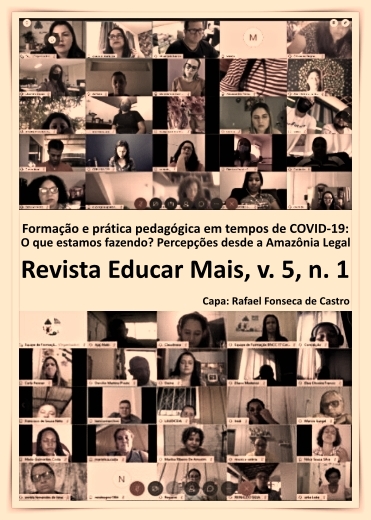Implications of the emerging paradigm for the continuing training of the teachers of the municipal Palmas/TO network in times of pandemic
DOI:
https://doi.org/10.15536/reducarmais.5.2021.2121Keywords:
Keywords: Continuing Education; Emerging Paradigm; Remote Teaching.Abstract
The work aims to understand how the Palmas-TO municipal education network is developing, in the context of the Covid-19 Pandemic, the training process, so that teachers are the protagonists in remote education. The procedure adopted to achieve the goal was the qualitative approach of bibliographic research listing theoretical and empirical references that underpin the proposed discussion. To think of the continuing formation in ontological focus from complexity and transdisciplinarity, in a scenario of disorder, uncertainties and indeterminism reaffirmed by the pandemic, requires a profound change of systemic nature making the necessary connections between human being, knowledge and reality. At the present time, there is an urgent need to break with the reductionism that prevail in the continuing training processes of education professionals and the traditional approaches that subsidize their pedagogical practices. From this juncture we will seek to understand the possibilities that quantum reality, the basic principle of the emerging paradigm, presents to us in relation to the continuing training of educational professionals in the face of the pandemic.
Downloads
References
BEHRENS, M.A. O paradigma emergente e a prática pedagógica. Petrópolis: Vozes, 2005.
BEHRENS, Marilda. O paradigma emergente e a prática pedagógica. 5 ed. Petrópolis, RJ: vozes, 2011.
CARVALHO, José Maurício. História da filosofia e tradições culturais: um diálogo com Joaquim de Carvalho. Porto Alegre: EDIPUCRS, 2001.
COLOM, Antoni J. A (des)construção do conhecimento pedagógico: novas perspectivas para a educação. Porto Alegre: Artmed, 2004.
MORAES, Maria Cândida. O paradigma educacional emergente. 16 ed. Campinas, SP: Papirus, 1997.
MORAES, Maria Cândida. Pensamento eco-sistêmico: educação, aprendizagem e cidadania no século XXI. Petrópolis: Vozes, 2004.
MORAES, M. C.; TORRES, S. Pesquisando a partir do pensamento complexo: elementos para uma metodologia de desenvolvimento eco-sistêmico. Educação, Porto Alegre, v. 29, n. 58, p. 145-172, 2006.
MORAES, M. C. Ecologia dos saberes: complexidade, transdisciplinaridade e educação: novos fundamentos para iluminar novas práticas educacionais. São Paulo: Antakarana/WHH – Willis Harman House, 2008.
MORAES, M. C.; VALENTE, J. A. Como pesquisar em educação a partir da complexidade e da transdisciplinaridade? São Paulo: Paulus, 2008.
MORAES, Maria Cândida; NAVAS, Juan Miguel Batalloso (Orgs.). Complexidade e transdisciplinaridade em educação: teoria e prática docente. Rio de Janeiro: Walk, 2010.
MORIN, Edgar. Os sete saberes necessários à educação do futuro. São Paulo: Cortez: Brasília, D.F. UNESCO, 2000.
MORIN, Edgar. Educar na era planetária. O pensamento complexo como método de aprendizagem pelo erro e incerteza humana. Tradução de Sandra Trabucco Valenzuela. São Paulo: Cortez; Brasília, DF: UNESCO, 2003.
MORIN, E. Cabeça bem feita: repensar a reforma, reformar o pensamento. Rio de Janeiro: Bertrand, Brasil, 2006.
MORIN, Edgar. O meu caminho. Entrevista com Djénane Kareh Tager. Lisboa: Instituto Piaget, 2008.
MORIN, Edgar. Introdução ao pensamento complexo. 4.ed. Porto Alegre, RS: Sulina, 2011.
NICOLESCU, B. O manifesto da transdisciplinaridade. São Paulo: Triom. 1999.
PINEAU, G.; PATRICK, P. Trandisciplinarité et formation. Paris: L´Harmattn, 2005.
PINEAU, Gaston. Temporalidade na formação: rumo a novos sincronizadores. Trad. Lucia Pereira de Souza. São Paulo: Trion, 2003.
SOMMERNAN, A. Formação e transdisciplinaridade: uma pesquisa sobre emergências formativas do CETRANS. Dissertação (Mestrado em Ciências da Educação) - Faculdade de Ciências e Tecnologia da Universidade de Nova Lisboa e à Université François Rabelais de Tours. Lisboa: 2003. Disponível em: https://run.unl.pt/handle/10362/400. Acesso em: 20 set. 2006.
TORRE, S. DE LA; BARRIOS, O. Curso de formação de educadores: estratégias didáticas inovadoras. São Paulo: Madras, 2002.
Downloads
Published
How to Cite
Issue
Section
License
Copyright (c) 2021 Maria José de Pinho, Marina Carla da Cruz Queiroz, Jocyléia Santana dos Santos

This work is licensed under a Creative Commons Attribution-NonCommercial 4.0 International License.
DECLARATION OF RESPONSIBILITY: I hereby certify that I partially or fully participated in the conception of the work, that I did not hide any links or financial agreements between the authors and companies that may be interested in this article publication. I certify that the text is original and that the work, partially or fully, or any other work with a substantially similar content written by me, was not sent to any other journal and it will not be send while my submission is being considered by Revista Educar Mais, whether in printed or electronic format.
The author responsible for the submission represents all the authors of the manuscript and, when sending the article to the journal, guarantees s/he has obtained the permission to do so, as well as s/he guarantees the article does not infringe upon anyone’s copyright nor violate any proprietary rights. The journal is not responsible for the opinions expressed.
Revista Educar Mais is Open Access, does not charge any fees, whether for submission or article processing. The journal adopts Budapest Open Access Initiative (BOAI)’s definition, i.e., any users are permitted to read, download, copy, distribute, print, search and link to the full texts of these articles.
All the articles are published under the Creative Commons Atribuição-NãoComercial 4.0 Internacional license. The authors keep the copyright of their production. That way, they must be contacted directly if there is any interest in commercial use of their work.
















